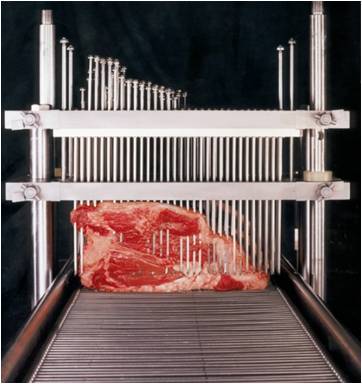As XL Foods prepares to open next week, it’s still not clear if XL used meat tenderization in its processing, yet Alberta Health Services has previously suggested that tenderization of steaks at Costco stores in Alberta may have factored in the E. coli illnesses.
Shouldn’t it be easy to ask?
Mechanical meat tenderizers use needles and blades to penetrate steak and roasts. Health Canada says the process of mechanically tenderizing  meat is a “very common practice” that is used by suppliers, retailers and restaurants “to improve the tenderness and flavour of cooked beef.”
meat is a “very common practice” that is used by suppliers, retailers and restaurants “to improve the tenderness and flavour of cooked beef.”
The process can also drive E. coli on the surface of the meat into the centre, making it harder to kill during cooking, CBC’s Marketplace found during a recent test.
Marketplace worked with Rick Holley, a food scientist and microbiologist at the University of Manitoba, to see how the mechanical tenderization process works and what potential risks might exist.
Holley said up to two per cent of meat cuts, steaks in particular, can carry the organism on the surface.
In a test, Holley spread E. coli O157:H7 that he grew in a lab on a piece of beef. The meat was then run through the machines to see what happened to the bacteria on the surface.
In that instance, Holley found that 10 per cent of the bacteria from the surface was forced into the centre of the meat.
An earlier test using a gel visible under ultraviolet light also found that the material on the surface of the meat doesn’t only contaminate the meat – it can also spread to the needles or blades on a tenderizing machine. Holley said it can be “almost impossible” to properly clean the machines, which can then spread E. coli to other pieces of meat that are tenderized.
It’s not clear exactly how much meat processed in Canada goes through mechanical tenderization, but the Public Health Agency of Canada says in a study it could be between 20 to 50 per cent.
It’s difficult to tell which meat products have been tenderized, because after the meat has been treated the tiny holes seal up and disappear.
Holley said that the recent E. coli outbreak is just another symptom of a continuing problem. “Clearly, what we are seeing represents a failure, again, in the system,” he said. “And if things don’t change, we can expect to see this in the future.”
Canada’s agriculture minister, Gerry Ritz, said Friday federal officials are looking at issues surrounding mechanically tenderized meat, stating, such a label would warn people “that if you’re buying this tenderized product at a lesser price, because it’s a lesser cut of meat that’s been tenderized, that it should be labelled to warn you to cook it beyond the temperature that’s required.”
